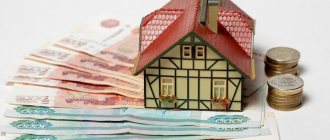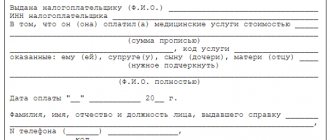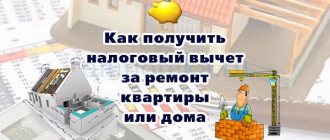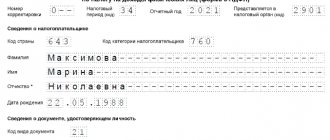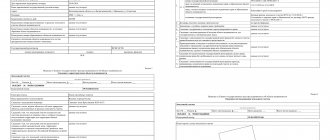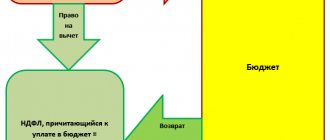A deduction generally means a reduction in the tax base or calculated tax by the amount of certain expenses. Such a mechanism is provided for calculating various payments, including the tax that is levied on the income of employed citizens. Whether tax deductions are allowed depends on the regime applied to it. In this article we will look at deductions and figure out when an entrepreneur can receive them.
But first we need to clarify the concept itself. A deduction is not a benefit, but a mechanism for reducing and refunding overpaid tax. The right to it arises due to the fact that the payer has incurred certain expenses. And when calculating the base, they can be taken into account. Accordingly, if the tax was not paid at all due to the fact that it is not provided for by the regime, then nothing will be returned.
Right to deduct personal income tax
Most of the deductions are provided for by the personal income tax. It is paid by all citizens working under labor and civil contracts. In addition, personal income tax is subject to certain other types of income, for example, received from renting or selling property, from investing, under insurance contracts, and others.
Free tax consultation
Individual entrepreneurs in the main tax regime (OSNO) also pay personal income tax. Can an individual entrepreneur receive a tax deduction if he uses this tax system? Of course, it can, since all the rights of a taxpayer apply to it. But those individual entrepreneurs who have chosen preferential regimes (USN, PSN, Unified Agricultural Tax, NPD) do not have the right to deductions for personal income tax. They are not payers of this tax, they have no tax base, which means they have nothing to reduce.
At the same time, it cannot be said that entrepreneurs in special regimes are completely deprived of the right to tax deductions for personal income tax. After all, at the same time as their business, they can receive other income that is subject to this tax. For example, if an individual entrepreneur on a simplified system simultaneously works for hire or rents out real estate, then he retains the right to deduction. But it can only be applied to income subject to personal income tax.
Thus, the rule is very simple: if an individual entrepreneur pays personal income tax (standard rate of 13%), then he can receive the deductions provided for in its calculation.
Example 1
Citizen Smirnov worked in a company and received a salary of 40,000 rubles, from which his employer withheld monthly and transferred personal income tax to the budget. When calculating the tax, a standard deduction per child was used in the amount of 1,400 rubles. The tax was calculated as follows: (40,000 - 1,400) * 13% = 5,018 rubles.
Smirnov decided to try his hand at business, for this he registered an individual entrepreneur and immediately switched to a simplified tax regime. However, he had not yet quit his job, meaning he still received wages. The employer still continued to calculate personal income tax from her and apply the child tax deduction. The entrepreneur must calculate the tax on business income under the simplified tax system himself; the personal income tax deduction does not apply to this income.
A few months later, Smirnov decided to devote his time entirely to a new business and left his job. He no longer had income that was subject to personal income tax at a rate of 13%. Accordingly, Smirnov no longer has the right to apply a personal income tax deduction.
Starting from the next calendar year, the businessman decided to change the tax regime from simplified to basic - it was more profitable for the business. He began to pay personal income tax, since this is the tax that individual entrepreneurs pay in the main regime, which means that the right to apply tax deductions has arisen again.
There are several types of personal income tax deductions. Articles 218-221 of the Tax Code of the Russian Federation are devoted to them. Let's look at the most common ones in more detail.
Can an individual entrepreneur return personal income tax?
Can a sole proprietor return the 13 percent income tax? This is possible in the following cases:
- at the time of purchasing housing for cash (Article 220 of the Tax Code of the Russian Federation);
- when purchasing housing under a targeted loan agreement (Article 220 of the Tax Code of the Russian Federation).
Important! When registering a property deduction under a targeted loan agreement, an individual entrepreneur can return the interest on the mortgage.
Conditions for this
In order to exercise his right to receive a preferential refund, the taxpayer must comply with a number of conditions:
- An entrepreneur must have a permanent source of income, from which he pays 13% tax contributions to the budget.
The exception is dividends (income received from equity participation in an organization) and winnings, for which tax deductions are not applied (Article 210 of the Tax Code of the Russian Federation). - An entrepreneur paying personal income tax for himself is obliged to submit a 3-personal income tax declaration within the prescribed period (before April 30 of the year following the reporting year), reflecting in it the information necessary for the calculation: calculated tax, declared amount of property deduction, in some cases a certificate in form 2 -NDFL (for entrepreneurs working under an employment contract or leasing property as an individual).
- It is necessary to provide a package of documents confirming the entrepreneur’s ownership of the purchased housing (purchase agreement, registration certificate).
- A prerequisite is the fact that the property is registered directly in the name of the entrepreneur, his spouse or child.
If all of the above conditions are met, the entrepreneur is guaranteed to have the opportunity to obtain a property deduction. We talked in more detail about what a tax deduction is when buying and selling an apartment here.
In cases where it is impossible to issue compensation for the purchase of an apartment, the entrepreneur has the right to arrange the payment through his spouse, subject to her official employment and the further possibility of providing a certificate of income to the tax authority in Form 2-NDFL. This will confirm the existence of income on which income tax is paid in the amount of 13%. You can find out about the possibility of receiving a tax deduction for unemployed citizens or pensioners here.
Professional deductions
Let's start with them, since this is the only type of deduction intended specifically for entrepreneurs. These deductions are also used by individuals who are engaged in private practice, receive royalties or income under civil contracts. When calculating the personal income tax base, they can deduct documented expenses. But only those that are directly related to generating income.
It happens that there is no documentary evidence. In this case, can an individual entrepreneur receive a professional tax deduction without them? Yes, but only in the amount of 20% of the income. For example, his revenue was 100,000, and his expenses were 80,000 rubles. If the individual entrepreneur has supporting documents, then the tax will be calculated as follows0) * 13% = 2,600 rubles. If there are no documents, only 20,000 rubles can be deducted. The tax will be 0) * 13% = 10,400 rubles.
Amount of benefit when purchasing real estate
The benefit is represented in the amount of expenses incurred when purchasing an apartment. Features of providing a deduction:
- The limit value is limited to 2 million rubles. When using mortgage lending, a separate deduction is provided for the interest paid by the person on the target mortgage, the maximum amount of which is 3 million rubles.
- The unused balance is carried forward to a future period until the required amount is used or to an object purchased in the future.
- The benefit is provided within the limits limited by income, the amount of expenses incurred or the maximum deduction amount.
A deduction is provided for a property in the amount of expenses for the acquisition and repairs in the case of purchasing housing in a new building with rough finishing.
An example of using a property deduction
IP Kovalev M.M. operates at OSNO. Revenue for 2015 amounted to 8,750,000 rubles, expenses from operating activities indicated in the declaration in the form of a professional deduction amounted to 4,200,000 rubles. In 2015, an entrepreneur purchased an apartment worth 2,800,000 rubles. In the declaration, the individual entrepreneur indicates:
- Amount of deductions: B = 4,200,000 + 2,800,000 = 7,000,000 rubles;
- The amount of the taxable base for personal income tax: 8,750,000 – 7,000,000 = 1,750,000 rubles;
- The amount of tax payable to the budget: 1,750,000 x 13% = 227,500 rubles.
- Conclusion: Based on the results of 2015, the individual entrepreneur must pay personal income tax to the budget in the amount of 227,500 rubles.
Standard deductions
The peculiarity of these deductions is that they are in no way related to the expenses incurred by the citizen, and therefore resemble benefits. Another distinctive feature is that in most cases they are of symbolic size.
The most common option is the children’s deduction mentioned in the example about IP Smirnov. For the first and second children, 1,400 rubles must be deducted from the tax base, for the third and each subsequent child - another 3,000 rubles, for a disabled child - 12,000 rubles. A deduction in this amount can be claimed for each month of the year until the taxable income of an individual entrepreneur exceeds 350,000 rubles.
There are other deductions in this group - for veterans, heroes of the USSR or the Russian Federation (500 rubles), liquidators of the Chernobyl disaster (3,000 rubles) and other persons.
Features of obtaining a deduction when purchasing a home by an entrepreneur
According to the law of the Russian Federation, tax exemption for the purchase of apartments and houses applies only to personal income tax payers. The dual status of individual entrepreneurs does not allow us to draw a clear boundary and develop a unified algorithm.
General taxation system
As an individual entrepreneur on OSNO, it is enough to submit an annual declaration to the territorial inspection and attach documents regarding the transaction. The deduction covers income from both commercial and other economic activities. It will not be possible to immediately reduce contributions to the budget due to advance payments. At the end of the year you will have to make a refund.
Example. An entrepreneur in general mode bought an apartment worth 4,600,000 rubles. The total revenue from the business in the year the transaction was concluded was 7,500,000 with costs of 5,800,000.
Let's calculate the taxable base. Business income: 7,500,000–5,800,000 = 1,700,000.
Costs of purchasing an apartment will be exempt from personal income tax up to 2 million rubles. The deduction will fully cover the tax base:
2 000 000–1 700 000 = 300 000.
The entrepreneur uses the balance of 300 thousand next year when calculating obligations to the budget.
Special regimes and self-employment
The capabilities of this category of payers are limited. Individual entrepreneurs using the simplified tax system, UTII, unified agricultural tax or patent are not payers of personal income tax. They do not fall under Article 220. Filing a declaration is allowed only when income appears that is taxed according to the rules of Chapter 23 of the Tax Code of the Russian Federation. Thus, merchants who combine business and work under an employment contract have the right to insist on a tax refund.
Example. The entrepreneur provides services for UTII and at the same time works in a local animal clinic. Business revenue for 12 months amounted to 670 thousand rubles. In addition, for the year, the veterinary institution paid the specialist a salary of 420 thousand rubles. Personal income tax was withheld from the amount at a rate of 13% - 54,600 rubles. In December, a businessman bought a house for 1,800,000.
A property deduction will be provided for only 420 thousand. Since the house was purchased at the end of the year, the excessively collected tax in the amount of 54,600 rubles will be returned to the veterinarian’s account. Revenue from business on UTII will not be taken into account.
The balance of 1,380,000 will be allowed to be used in the next reporting period as part of labor relations. The entrepreneur may receive notice of the right to deduction. In this case, the employer will not withhold personal income tax from wages.
If a “special regime” person does not have income subject to personal income tax at a rate of 13%, he cannot claim a property deduction. The Russian Ministry of Finance, in letters No. 03-04-05/32776 and No. 03-04-05/60785, allowed tax refunds through a spouse. The condition will be that the property be registered as joint ownership. If the rights to the object are registered in shares, you will have to confirm the reality of the costs of each owner.
The uncertainty of the legal status of self-employed citizens significantly complicates the application of the rules. Formally, they are recognized as personal income tax payers. However, until the end of 2022, tax holidays apply to such persons. In fact, nothing is transferred to the budget, and therefore a return is impossible. Self-employed citizens can use the right to deduction according to the same scheme as “special regime employees”. They have no alternatives.
Important! If cases of illegal registration of property deductions are identified, the regulatory authority will recover unjust enrichment through the court. Explanations are presented in the letter of the Federal Tax Service of Russia No. SA-4-7/ [email protected]
Social deductions
This group includes several types of deductions, including:
- for education – your own, your children’s, your brother’s or sister’s;
- for medical services, medicines and voluntary health insurance for yourself, a child, parents or wife/husband;
- for voluntary insurance or non-state pension provision for oneself, a spouse, parents or a disabled child;
- on the funded part of your labor pension;
- for charity (up to 25% of income);
- to undergo an independent assessment of your qualifications;
- for physical education and health services for yourself or a child (this is a new type of social deduction, it will be applied from 2022).
The maximum amount of social deductions in total is 120,000 rubles. The payer decides for himself how to distribute them. Amounts transferred to charity are not included in this limit, as are expensive treatment and education of children. For each child's full-time education, up to 50,000 rubles can be deducted per year. You can apply for a social deduction no later than 3 years after the date in which the right to it arose. This follows from Article 78 of the Tax Code of the Russian Federation.
Does a citizen have the right to such a deduction if he studied, for example, in a foreign language course? The law does not stipulate any restrictions on the direction of study. These can be any required courses. The main rule is that the educational institution must have the appropriate license.
How to make an income tax refund?
Required documents
At the end of the year , an individual entrepreneur applying for compensation must prepare a standard package of documents .
- Declaration in form 3-NDFL (fill out independently and submit to the tax authority).
- The general package of documents must contain a certificate in form 2-NDFL (it reflects the amount of taxes withheld by the employer for the required period).
- Prepare copies of documents confirming ownership of the acquired property:
- DCT (in case of purchasing an apartment);
- certificate of state registration of rights (for the acquisition or construction of a house, land, purchase of a share or room);
- loan agreement or target loan agreement (when repaying mortgage interest and further processing of property deductions for them).
- Prepare copies of payment information:
- confirmation of expenses for the purchase of an apartment (cash and sales receipts, bank statements, acts of purchase of materials, receipts for receipt orders);
- confirmation of payment of interest on a mortgage or loan agreement (certificates from a credit institution, extracts from personal accounts).
- Property acquired into common ownership will require confirmation in the form of the following documents:
- application of the spouses for the distribution of property deductions;
- a copy of the marriage certificate.
The collected package of documents must be accompanied by an application for income tax refund, tips for filling it out and a sample of which you will find in this material.
Where and when to submit?
The listed package of documents, together with the 3-NDFL declaration, must be submitted to the tax authority at the place of registration of the individual entrepreneur. You can start applying for benefits at any time , even immediately after purchasing the property.
The transfer of the requested payment (if the municipal body makes a positive decision) will be made only at the end of the tax period). To obtain a deduction, information for the three previous years is taken into account.
Sum
As for individuals, the procedure and amounts for personal income tax refunds for individual entrepreneurs are identical. Thus, when registering ownership of an apartment, the maximum amount for payment is 2 million rubles, regardless of the actual purchase price. In this case, the maximum amount of property deduction will be 260 thousand rubles.
In the case of mortgage lending to individual entrepreneurs, the amount of preferential calculation will be increased to 3 million rubles.
Important! Since 2014, a property deduction has been possible in relation to several pieces of property, up to the exhaustion of the return limit amount.
Self-calculation
As stated earlier, a refund of the property deduction is possible within 13% of the cost of the purchased housing.
With mortgage lending, the buyer can count on a refund of the following amounts:
- 2 million rubles (cost of purchasing living space);
- 3 million rubles (the amount of mortgage interest paid).
The first option for calculations can be applied to several properties, until the final selection of the amount of the deduction is reached (that is, until the property return reaches the maximum possible level of 260,000 rubles). If, when purchasing an apartment, the deduction amount is less than the maximum possible, the right to the benefit is retained for subsequent purchases.
For example: an apartment was purchased for 1,560,000 rubles. The calculation of the property deduction that the owner can claim is carried out as follows:
1,560,000*13% = 202,800 rubles.
He can request payment of the missing amount of compensation in the amount of 57,200 (260,000 - 202,800) rubles upon the next purchase of real estate.
An example of a calculation when purchasing an apartment with a mortgage:
2,000,000*13% + 3,000,000=13% = 260 thousand + 390 thousand = 650 thousand rubles.
Payment terms
In accordance with clause 6 of Article 78 of the tax legislation, the amount of the claimed deduction must be returned to the applicant within 30 days from the date of registration of the application for the deduction. But at the same time, Article 88 somewhat contradicts it, indicating the return of the property deduction only after the end of the desk audit (which, as is known, lasts at least 3 months).
In addition, it is not indicated anywhere whether we are talking about full months, because the taxpayer can submit an application in the last days. At the same time, Federal Tax Service employees allow the possibility of returning the deduction within 30 days. It turns out that the expected period for returning the property deduction is at least 4 months.
The following reasons for delayed payments may arise:
- lack of some documents;
- detection of facts of inconsistency prohibiting the owner from receiving a property deduction;
- errors, human factor.
Reference. If the requested refund is not received within the maximum possible period, it is necessary to contact the head of the tax authority with a written complaint (drawn up in duplicate, with marks of acceptance by the tax authority). Article 138 of the Tax Code allows for recourse to court in such cases.
For the convenience of our readers, we have prepared step-by-step instructions for returning personal income tax when purchasing an apartment. We also note that a tax deduction can be obtained not only when purchasing, but also when selling an apartment that has been owned for less than 3-5 years. You can find out more about this here.
Property deductions
Property deduction is due to those personal income tax payers who:
- incurred costs for the purchase of housing or land for building a house;
- received income from the sale of real estate or other property;
- sold the shared construction project, that is, assigned the right to claim it;
- sold a share in the organization.
Most often, those who have purchased housing apply for a property deduction. The following expenses can be deducted:
- in the amount of the cost of the object, but not more than 2 million rubles;
- in the amount of interest paid on targeted loans for the purchase of real estate or for refinancing such loans, but not more than 3 million rubles.
Example 2
An individual entrepreneur on OSNO Pavlov bought an apartment for 3 million rubles, another 1 million was interest on the mortgage. He can claim a deduction for the cost of the apartment, but not more than 2 million, and return 2,000,000 * 13% = 260,000 rubles from the budget. From interest you can return the amount of 1,000,000 * 13% = 130,000 rubles. Total 390 thousand. Let’s assume that personal income tax for the past year amounted to 130 thousand. This means that this exact amount will be returned, and the rest will be transferred to the next 2 years.
The property deduction is granted once in a lifetime and can be claimed at any time after such a right arises. The question arises: does a citizen have the right to keep the remainder of the deduction if the apartment cost less than 2 million? There is a nuance here related to the acquisition period:
- If this happened in 2014 or later, the deduction can be divided between the objects. Let's say the apartment cost 1.5 million rubles. This amount will be declared as a deduction, and the remaining 500 thousand will remain. They may come in handy when purchasing another property.
- If the apartment was purchased before 2014, then the deduction cannot be divided. In this case, it can only be declared within the limit. That is, if the apartment costs 1.5 million, the deduction of 500 thousand will simply disappear.
Free accounting services from 1C
Opportunity for individual entrepreneurs in a special mode
The greatest interest usually arises among special regime officers regarding property deductions. For example, does an individual entrepreneur using the simplified tax system have the right to a tax deduction when buying an apartment? We explained above that an entrepreneur cannot use it on his own, because he does not pay personal income tax. However, there is a nuance - his spouse can claim a deduction if he has the right to do so.
For example, an entrepreneur Petrov bought an apartment using the simplified tax system. He does not have the right to a property deduction, since he does not pay personal income tax. But the businessman’s wife, who is employed and pays personal income tax, has it. The apartment was acquired during marriage and is considered the joint property of the husband and wife. Therefore, citizen Petrova has the same right to deductions as he himself.
Conditions for tax deduction refund: general rules
When developing and explaining the concept of “tax deduction,” legislators identified several basic rules for obtaining it. In particular, the following conditions must be met:
- The largest amount by law for using a tax deduction is 2 million rubles. If an apartment or some other piece of real estate costs more, then everything above 2 million rubles. will not be taken into account;
- The personal income tax is 13%, so it is easy to calculate that the maximum tax deduction (that is, from 2 million rubles) will be equal to 260 thousand rubles. It is worth noting that the amount of the tax deduction can be returned at any time period - in this case there are no restrictions;
- Since the beginning of 2014, a rule has been in force according to which it is possible to receive a tax deduction not from just one apartment, but from several apartments or any other real estate at once. The main thing is to comply with the requirement that their price does not exceed 2 million rubles.
- you can include in the deductible the cost of repairs and finishing of a new apartment if the purchase and sale agreement states that the housing is purchased without finishing;
- if real estate is purchased from close relatives (parents, brothers or sisters, own children), the right to a tax deduction for its acquisition is lost, since in this case the partners in the transaction are recognized as interdependent individuals (clause 1 of Article 105.1 of the Tax Code of the Russian Federation);
- If the property was purchased with a mortgage, then a tax deduction is also made from the interest paid on the mortgage loan. Moreover, in this case, taking into account interest, a deduction can be made from an amount of 3 million rubles. This norm was developed as a measure of additional support for the development of the Russian mortgage market.
The above rules apply not only to individual entrepreneurs, but equally to all other citizens of the Russian Federation.
History: until 2014, a tax deduction could be applied to only one piece of real estate, but now this restriction has been lifted. The main thing is that the total cost of the acquired real estate should not exceed 2 million rubles.
Thus, it is obvious that the tax deduction is an excellent help to support those citizens who are employees and receive a “white” salary. In this sense, it is somewhat more difficult for individual entrepreneurs: they cannot always return taxes paid to the state.
The procedure for obtaining an individual entrepreneur deduction
Unlike ordinary personal income tax payers, individual entrepreneurs in the main mode calculate their taxes, pay them and submit reports independently. If deductions are required, they are declared in the 3-NDFL declaration, which must be submitted by April 30 of the following year.
Otherwise, tax deductions for individual entrepreneurs are provided according to general rules, since there are no special rules in the Tax Code of the Russian Federation.
Attention! Starting with reporting for 2022, a new form 3-NDFL is used, approved by Order of the Federal Tax Service of Russia dated October 15, 2021 N ED-7-11/ [email protected]
For each deduction you will need an individual set of documents. If we talk about property deductions for the purchase of an apartment, you will need:
- Passport.
- Certificate of ownership of the apartment or extract from the Unified State Register of Real Estate.
- An apartment purchase and sale agreement or other document on the basis of which the property was purchased.
- Transfer acceptance certificate.
- If at the same time a deduction is claimed for interest on a loan - a mortgage, loan or other agreement.
- Payment documents.
- Marriage certificate, if the owner is a member of it.
- Certificate 2-NDFL, if the individual entrepreneur works in parallel.
These documents are provided in the form of originals and copies. They are attached to the 3-NDFL declaration.
Entrust reporting to specialists
General concept of tax deduction for individual entrepreneurs
All individual entrepreneurs are taxpayers and, depending on the chosen taxation system, pay various taxes to the state budget.
The obligation to pay a particular tax is specified in the Tax Code of the Russian Federation. Find out what tax changes individual entrepreneurs need to take into account in 2022 here.
However, there are situations when it becomes possible to reimburse the amounts of taxes paid. All of them are described in the Tax Code of the Russian Federation and are called “tax deductions”. A tax deduction is the right of a taxpayer to reimburse a certain amount of taxes paid or to be released from the obligation to pay them.
For information about what a VAT tax deduction is, see the material “What are VAT tax deductions” .
Standard
It has two main types: deduction for the taxpayer and deduction for the child.
Deduction per taxpayer
Indicated by two fixed amounts:
- 13 categories of individuals can receive 3,000 rubles monthly, including veterans and disabled Chernobyl victims, WWII veterans, nuclear testers and others;
- 500 rubles are available monthly to 15 categories of persons, including Heroes of the Russian Federation and the USSR, veterans of the siege and concentration camp prisoners, participants in combat operations in Afghanistan and others.
A complete list of citizens who have the opportunity to receive compensation is approved in Article 218 of the second part of the Tax Code of the Russian Federation. Deductions per taxpayer are not cumulative. If the applicant’s status falls into two categories, only one deduction is given - the maximum of the corresponding ones.
Child deduction
Provided regardless of the availability of other standard tax deductions. Payments depend on the applicant's status.
- For the child's parent, parent's spouse, adoptive parent:
1400 rubles - for the first and second child;
- 3000 rubles - for the third and each subsequent child;
- 12,000 rubles - for each disabled child
- 1400 rubles - for the first and second child;
The procedure for receiving and the specifics of calculating standard deductions are defined in Article 218, Part 2 of the Tax Code of the Russian Federation.
